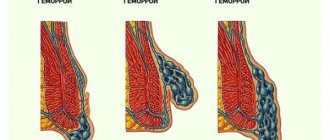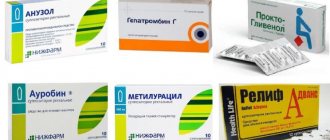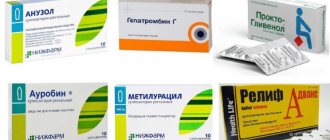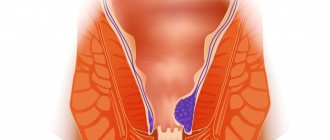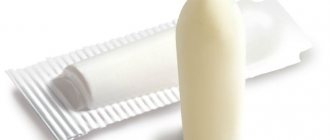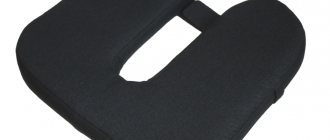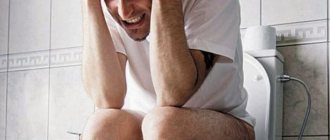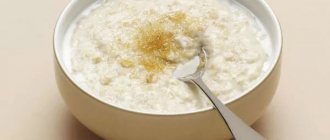- Causes
- Manifestations
- Prevention
- Conservative treatment of hemorrhoids
- Diet for hemorrhoids
- What can you eat if you have hemorrhoids?
- Dishes to prevent constipation
- Side dishes, appetizers, main courses
- Vegetables and fruits, sweets
- Beverages
- What foods should you not eat if you have hemorrhoids?
Hemorrhoids are inflammation of vascular formations in the anus, which are called hemorrhoids. The prevalence of the disease is quite high. According to statistics, up to 15% of the adult population suffers from it. In this article you will learn what hemorrhoids are, what factors provoke their development, what the diet should be for people with such a diagnosis and what foods should be avoided.
Causes
The disease occurs due to varicose veins of the anus. Proctologists treat hemorrhoids. Among the main causes of the pathology are improper diet, indigestion and frequent constipation, genetic predisposition, and numerous pregnancies in women.
People who spend a lot of time sitting are at risk of developing hemorrhoids. The same applies to those who engage in strength sports and work that involves lifting weights. Hemorrhoids in teenagers are not as common as in adults. The reason for the development of pathology at a young age is a tendency to varicose veins, chronic constipation, damage to the vessels of the anus.
Hemorrhoids in men
Hemorrhoids occur slightly more often in men than in women. The reason for this is the lack of attention on the part of the stronger sex to their health. They see a doctor in the later stages of the disease. The causes of hemorrhoids in men are as follows:
- work with a predominance of heavy physical labor, heavy lifting;
- sedentary work;
- presence of bad habits: alcohol abuse, smoking;
- nutritional obesity;
- neglecting the need to regularly empty the intestines;
- prolongation of the act of defecation;
- chronic stress.
The causes of secondary hemorrhoids are somatic diseases: oncological processes, portal hypertension, heart failure.
Manifestations
With hemorrhoids, the external and internal hemorrhoids become inflamed. This leads to burning, itching and pain in the affected area. Many patients complain of a sensation of a foreign body in the rectum.
Discomfort increases with bowel movements, physical labor and prolonged sitting. If the external venous node is affected, the patient may see negative changes during self-examination. A sign of the disease is a burgundy-bluish swelling, similar to a lump. The knot becomes dense to the touch, and touching causes pain.
If, when signs of pathology appear, a person does not consult a proctologist, chronic hemorrhoids develop. It is dangerous due to exacerbations. With them, hemorrhoids fall out, complications arise in the form of thrombosis and regular bleeding.
The symptoms of internal and external hemorrhoids coincide with other diseases of the rectum. If alarming symptoms occur, you should make an appointment with a proctologist. The patient is prescribed an examination to confirm the diagnosis and adequate treatment is selected.
Drug and minimally invasive treatment
Treatment of hemorrhoids at the initial stage can be carried out at home, since no special measures are required yet. The doctor usually prescribes the following:
- a course of vascular-strengthening drugs;
- suppositories for hemorrhoids to relieve pain, itching and other unpleasant sensations, as well as to fight inflammation and reduce lumps, heal, stop bleeding;
- therapeutic diet and special physical training after the exacerbation is relieved;
- To relieve pain and itching, it is recommended to use cold compresses, ice packs, warm chamomile baths,
During the second and third stages, when conservative methods are ineffective, minimally invasive procedures are prescribed such as:
- Sclerotherapy - substances are injected into the node that seem to glue its walls together. As a result, the tissues stop receiving nutrition and die.
- Infrared photocoagulation, electrocoagulation - the essence of the method is that the leg of the node is cauterized, and its tissues are deprived of nutrition, stick together and die.
- Ligation with latex rings is used for internal hemorrhoids of stages 1-3. Using an anoscope, a ring is placed on the leg of the node, which compresses the small vessels feeding the node. After about two weeks, the dead node is brought out along with the ligature.
- Cryotherapy is a short-term exposure of the node to liquid nitrogen. The goal is the same - to stop the blood supply to the tissues of the node. After that it disappears on its own.
The listed remedies for hemorrhoids are effective for small bumps, but they cannot be used for thrombosis, anal fissures, acute inflammation, and injuries.
Prevention
Experts emphasize the importance of preventing inflammation of hemorrhoids. Here is a list of recommendations given by proctologists:
- Avoid inactivity, which causes blood to pool in the pelvic area.
- Stop smoking and minimize alcohol consumption.
- If you are prone to constipation, it is necessary to identify and eliminate their cause and normalize your diet.
- Avoid situations that can lead to damage to blood vessels and the appearance of cracks in the anal mucosa.
Third stage clinic – external hemorrhoids
Inflamed nodes in the third stage of hemorrhoids are located due to their prolapse already at the exit of the anal canal. The hemorrhoid is often reduced only by hand, and the bleeding becomes profuse. Inflammation brings severe suffering to the patient with pain and frequent burning. The nodes are located like on a dial: at 3, 7 and 11 o'clock. The nodes can be detected both in the knee-elbow position and in the supine position - on the side with the knees brought to the stomach. Strangulated nodes are considered sources of microthrombosis of the vascular system of the pelvis. The third stage requires qualified treatment from a proctologist-surgeon.
Diet for hemorrhoids
Successful treatment of hemorrhoids can only be achieved if the patient is ready to change his lifestyle and follow the doctor’s recommendations. An important part of therapy for inflammation of hemorrhoids is the correct diet. The strongest restrictions are necessary during the period of exacerbation of the disease.
For inflamed hemorrhoids, you should carefully choose foods and methods of preparing them.
Here are the basic principles for constructing a menu for hemorrhoids:
- Dishes that lead to constipation and diarrhea should be excluded from your diet. The same applies to products that irritate the intestinal mucosa.
- The patient's daily menu should include vegetables, berries and fruits. The exceptions are varieties that are too sour and sweet, as well as those that strengthen the stool (unripe bananas and pears, persimmons, chokeberries). Fruits and vegetables are consumed fresh, stewed and boiled. Fermented milk products with live bacteria, viscous porridges, dishes with added bran, and unrefined vegetable oil are beneficial for digestion. Such food nourishes the body and stimulates the digestive process, and has a positive effect on intestinal motility. Plant-based foods high in fiber help prevent constipation.
- When building a menu, it is necessary to reduce the amount or completely abandon marinades and sauces with a high content of fat, salt and spices, smoked meat and fish, and baked goods made from wheat flour.
When diagnosed with hemorrhoids, split meals are optimal. It is advisable to eat 5-6 times a day in small portions. Food should not be very hot or cold. Food should be chewed thoroughly, so do not eat in a hurry.
Please note: when constructing a diet, it is necessary to take into account your overall health. For example, bran and foods high in coarse fiber can be harmful in diseases of the stomach and duodenum. If a patient is diagnosed with gallstone disease, the consumption of unrefined vegetable oil should be reduced.
Hemorrhoids 1st degree
The initial stage of hemorrhoids is asymptomatic and does not bother the patient. In some cases, itching and burning appears in the anus. Impurities of blood, pus and mucus form in the stool. Drops of blood are visible on the toilet paper. At the early stage of proctological disease, patients rarely seek medical help. It is extremely important to contact a medical specialist in time to begin treatment at the first stage and avoid complications.
Advanced forms of the disease are much more difficult to cure. At stage 1 of hemorrhoids, the patient is prescribed rectal suppositories or medications. They eliminate the inflammatory process, kill harmful bacteria, and improve blood flow in the vessels. Traditional medicine is used. Potato suppositories will help improve blood circulation in the anus and make bowel movements easier.
Dishes to prevent constipation
If hemorrhoids are inflamed, you should add oatmeal and pearl barley to your diet. They contain a lot of fiber and are useful for people prone to constipation. You can make crumbly and viscous porridges from oatmeal, and pearl barley can be added to soups and side dishes. To improve intestinal motility, dried prunes, dried apricots, and other dried fruits can be added to oatmeal dishes. Pearl barley porridge is consumed with fresh vegetables and vegetable oil.
To prevent constipation, first courses should be included in the diet. Vegetable soups are the most beneficial for digestion. Too fatty and rich meat broths should be avoided.
How are hemorrhoids treated?
The disease is treated using two methods: conservative and surgical. In the early stages, patients are prescribed a treatment regimen that includes oral and topical medications, as well as injections. The choice in favor of certain medications should be made by an experienced specialist after examination and thorough diagnosis. The treatment regimen for patients is individual and determined by the clinical picture, as well as the presence of other concomitant diseases (fissures, etc.), if any.
During surgical treatment, the nodes are excised. Latex ligation and infrared coagulation of hemorrhoids (not removal or laser treatment) are highly effective and minimally invasive methods in the treatment of proctological diseases, allowing the patient to be cured in the safest ways. After undergoing rehabilitation, the patient must strictly adhere to medical recommendations so that the disease does not develop again.
Side dishes, appetizers, main courses
Pasta and potatoes can be eaten in limited quantities. The same applies to any products with a high starch content, which enhances the fermentation process. It is advisable to eat the usual side dish of mashed potatoes with fresh or stewed vegetables. It is worth giving up pasta made from premium flour and flour sweets with cream.
As a source of animal protein, in addition to dairy products, lean meat, fish and seafood are recommended.
Cheese for hemorrhoids should be consumed with caution. Hard cheese contains a lot of fat, casein and lactose. This product strengthens the stool, which is unacceptable for constipation. Safer are soft curd varieties and brine cheeses: feta cheese, feta and suluguni. Unlike hard cheese, they have a mild laxative effect.
Eggs can be eaten soft-boiled.
What do specialist proctologists do?
Doctors at 7th Heaven do everything necessary to solve problems associated with anal diseases before they go too far.
We in no way replace our activities with the work of proctology departments of hospitals! The diseases of many patients who did not receive timely treatment can only be cured in a hospital bed in the proctology department of a hospital. Not only does each disease have a specific treatment, but each stage of the disease must have its own treatment method!
There are no universal treatment methods! But the treatment method should not be more severe than the disease itself.
Let us dwell on some specific issues that concern our patients.
Vegetables and fruits, sweets
If you have hemorrhoids, you should include peaches, apples, plums, melons and watermelons in your diet. Experts advise eating juicy fruits to prevent constipation. Fruits that are not ripe enough or that are too sour should be avoided. Such food can lead to stool upset, and diarrhea aggravates hemorrhoids due to irritation of the mucous membrane. Overripe fruits are undesirable, as they contribute to the fermentation process and cause flatulence.
Dried fruits are good for digestion, and nuts and seeds enrich the body with vegetable protein. Sweets allowed are honey, jam, marshmallows, marshmallows, and dry cookies. Sweets are consumed in small quantities, since simple carbohydrates lead to fermentation.
Is it true that hemorrhoids are a lifelong diagnosis?
No it is not true. Hemorrhoids are indeed regarded by medicine as a recurrent disease, but this statement also has its own nuances.
In particular, sometimes the expansion of hemorrhoidal veins is caused not by external factors (weight lifting), but by internal problems with the venous system. Weakness and thinning of veins throughout the body can lead to a number of diseases, the list of which includes hemorrhoids. Completing a full course of vascular therapy will help solve this problem.
Do self-medication and folk remedies help in the fight against hemorrhoids?
This disease is serious, since tumor formations can degenerate into oncology. Therefore, self-medication is not only useless, but also absolutely irresponsible. It is important that when symptoms appear, putting aside false shame, contact a specialized specialist. The doctor will be able to make a comprehensive diagnosis, determine the extent of the disease and prescribe effective treatment.
Self-medication and folk remedies for hemorrhoids should not be used at all. They can only be auxiliary methods against the background of medications. But in any case, the use of traditional medicine methods must be approved by the treating specialist.
Are ointments effective against hemorrhoids?
Modern pharmacological companies have developed various drugs designed to combat this disease. They are effective if you undergo comprehensive treatment under the guidance of a specialized specialist. You should not just go to the pharmacy and buy any ointment. Without being a specialist in this field, you will not be able to determine the clinical picture. Therefore, there is no need to talk about the correct choice of ointment or other drug.
Self-medication will not help get rid of the disease, since patients with hemorrhoids need complex therapy. This treatment regimen should be prescribed by an experienced specialist in accordance with the characteristics of the clinical picture of the disease. Hemorrhoids of the first and second stages are highly treatable. You just need to find time to visit a doctor and consult. Today, there are a sufficient number of drugs for the treatment of hemorrhoids. Experienced doctors are able to effectively help every patient facing this problem.
Remember, the sooner you contact a proctologist, the faster and easier the treatment process will be. You should not let the disease progress as this may lead to the need for surgery. Also, hemorrhoids are dangerous because they can degenerate into oncology.
What foods are good for preventing intestinal diseases?
In order not to risk your health and not be a victim of hemorrhoids, it is recommended to include more vegetables, fruits and fiber in your daily diet.
For the prevention of hemorrhoids it is useful:
- Fiber-rich fruits and vegetables (apples, avocado, pumpkin, broccoli)
- Beetroot and beet salad
- Freshly squeezed juice, especially pumpkin juice
- Prunes
- Chew food thoroughly
Harmful:
- Hot, spicy, fried, smoked
- Marinades
- Eat dry
- Soda
- Whole milk
- Baking and flour
- Lots of sweets
- Pasta, white rice and bread
- Canned food
If microflora disorders are detected, it is better to cure them. Sometimes it is necessary to prescribe probiotics that restore the intestinal microbiome, and enzymes that help digest food.
*For patients with diagnosed intestinal disease, the diet is individually prescribed by a doctor.
